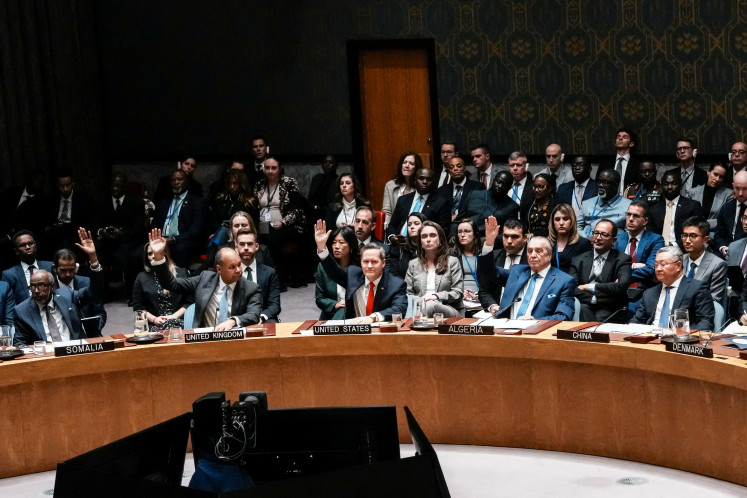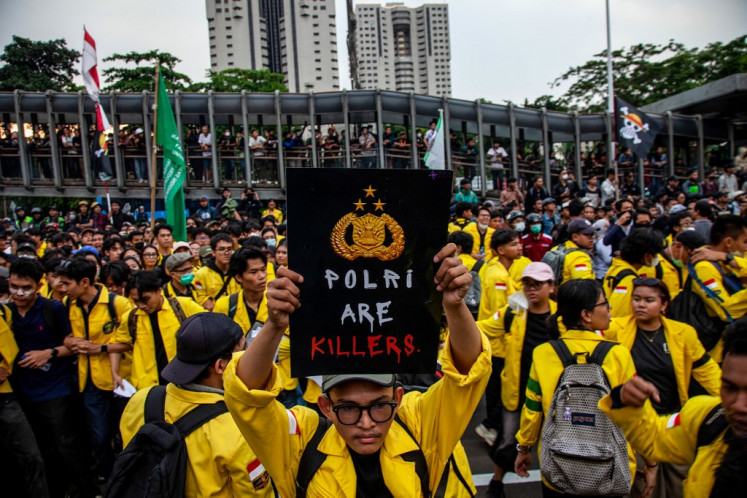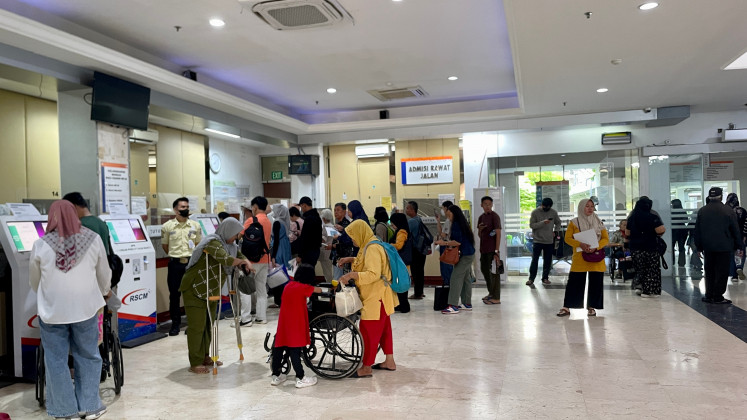Popular Reads
Top Results
Can't find what you're looking for?
View all search resultsPopular Reads
Top Results
Can't find what you're looking for?
View all search resultsNew ITE law: New hope or new fear for democracy?
The rise in the number of criminal charges laid using Law No
Change text size
Gift Premium Articles
to Anyone
T
he rise in the number of criminal charges laid using Law No. 11/2008 on Electronic Information and Transactions (the ITE Law) has caused pressure to mount from activists, academics, practitioners and policymakers for the law to be revised, which was finally realized last month.
However, the revision has sparked disappointment in the public, with several articles becoming a cause for concern.
First, the point of “the right to be forgotten (RTBF)” has been added into the new law in Article 26.
This point is still being debated in the world in terms of privacy and freedom of access.
Internet researcher Evgeny Morozov stated in 2012 that RTBF is “so ambiguous that even its proponents cannot often define what it is”.
This new article begs big questions for all of us, such as: Has Indonesia already found a concrete definition of the right to delete online information? Is Indonesia ready to implement this law with a good system that is strong and fair?
This is because RTBF must be “fairly” implemented. It should not restrict citizens from access to information and it should protect their privacy.
Actually, the issue of RTBF had come to the fore during a hearing between the House of Representatives’ information commission members and the minister of communications and information technology several months ago, but the debate over RTBF in the deliberation of the ITE law revision was less monitored by civil society until the new article was added into the draft.
Donny BU, the executive director of ICT Watch, deems the article to be “a progressive move, but it must be complemented by an implementing regulation”. He added that the spirit of RBTF was associated more with online media, which is prone to clashing with the 1999 Press Law.
RTBF therefore must not be used as a tool of digital censorship or digital concealment. In its press statement, civil society group ELSAM said it found “a lack of understanding about the existence of private or public data and without this formulation then it would be difficult for the public to access the track records of certain people — for example, political candidates or corrupt officials”.
If that happens, it will adversely affect Indonesian digital activities in the future. Another development is a more lenient punishment facing offenders. Article 27 (3) reduces the maximum prison sentence from six years to four, allowing a suspect to escape a lengthy detention, but criminal punishment for defamation stays, which means the flaw of this law persists.
Internet watchdog SAFEnet revealed that since the passage of the ITE Law in 2008 there have been 209 cases related to defamation in social media, the latest being a housewife from Makassar, Yusniar, who is facing trial because of her expression of disappointment with unnamed public officials on Facebook.
SAFEnet data also showed that users of this defamation article are mostly people who hold power, such as public officials and businesspeople.
The law in practice protects the powerful rather than citizens and the revision of the law confirms this. The law, regardless of the revision, serves as a deterrence, dissuading members of civil society from exercising freedom of expression in digital media.
The next concern is over the criminalization of acts of cyberbullying as stipulated in Article 29. There is no standard to identify cyberbullying in Indonesia and even the definition of cyberbullying varies among many sources, including regulators, educators, media and the general public.
The implementation of a law over cyberbullying is another complex issue. Therefore it is mandatory for law enforcers to define the boundaries of the act, circumstances, impacts, perpetrators, platforms and victims.
In 2011’s The Net Delusion, Morozov wrote that authoritarian governments can abuse their power and repress their citizens through the internet.
Therefore, Indonesian governments must be cautious in enforcing the ITE Law in order to protect democracy. The government has several important tasks to do with the internet to build sustainable democratic practices.
These include protecting and maintaining access, openness, fundamental online rights and the reliability of the internet for citizens. The internet can be a game changer as long as the government does not repress digital practices, especially by law.
Law enforcers and the judiciary need proper training just to avoid unnecessary criminalization of freedom of expression on the internet in the future.
Also, as citizens in a democratic country, our duty is to safeguard just implementation and to guard against the misuse of this ITE Law, in order to ensure that all citizens can freely express themselves and share in the digital media.
Furthermore, we all share the responsibility for effectively using the internet to enrich our democratic lives. Digital literacy is therefore imperative to overcome the rapid development of internet technology. The skill to judge online information is another important capacity to be learned and implemented by everyone.
On the other hand, Indonesian internet users need a particular capacity to produce online information with social responsibility and ethical values.
Therefore, the Indonesian government, civil society, academics, corporations and communities must be engaged and collaborate to develop, provide and implement formal and non-formal learning of digital media literacy, including access and retrieval, analysis and evaluation, communications and creation, and reflection and action in order to create and improve a digitally literate society in Indonesia and protect democratic practices in the digital era.
____________________________
The writer is a member of the Digital Media Research Centre, a PhD candidate and a sessional academic staff member of media and communications at the Queensland University of Technology, Brisbane.










